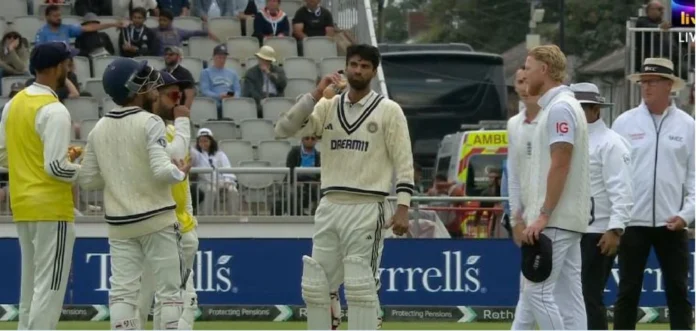By Neeraj Mishra
It is widely acknowledged that the British love nothing better than writing everything down: gazettes, laws, rules, sub-rules, appendices, schedules, and administrative orders. For anything left vague, they devised a curious concept called the “spirit or essence of the written word”. Having done that, they promptly cloaked themselves in the robe of “British sense of fair play”. The catch, of course, was that all of this applied only to the ruled, not the rulers. Heaven forbid you apply the same standards to the gora sahib.
This obsession with codification extended seamlessly into cricket—the so-called “Gentleman’s Game”—where every detail is accounted for. From the weight and colour of the ball to the width of the bat and the length of the popping crease, everything is governed by the Laws of Cricket, maintained by the Marylebone Cricket Club (MCC) since 1788—older than the IPC, CrPC, or any of the legal gifts the British left behind in India.
It is both the rulebook and the spirit of the game that were called into question at Old Trafford, when Ben Stokes offered Ravindra Jadeja a handshake to call off play—just as Jadeja stood on 89, closing in on a well-earned century, and Washington Sundar on 80, chasing a maiden ton. Was it within the rules? Yes. Was it within the spirit? That’s where the controversy begins.
“Everything’s got to stop because England are done,” remarked former Aussie wicketkeeper Brad Haddin. It’s hard to fathom why Stokes suddenly decided the match had no further purpose, citing among other things, the need to give his bowlers rest. What about the paying public?
The irony is striking. The first time I visited Lord’s—just for the experience—I paid five pounds to watch a dead rubber between two county sides in the final hour of a three-day match. The “Home of Cricket” didn’t refuse my money because “no result was possible and players were tired”. In fact, Sunil Gavaskar once entertained crowds during a similar dead hour in the ‘70s with spot-on imitations of Abdul Qadir, Sarfraz Nawaz, Jeff Thomson, and Dennis Lillee. Now that is the true spirit of cricket, especially when spectators have paid to watch it.
The Laws of Cricket deal explicitly with such final-hour scenarios. Rule 12 and Rule 16 outline how a match can end. Rule 16.10 states that only the umpires decide when to start or stop the game. Rule 12.7.9 dictates the last hour of play: the fielding team must bowl a minimum of 15 overs after completing 75 in the day—an effort to prevent time-wasting when defeat seems imminent. Crucially, if the captains decide to end the match early, the batting side must agree—typically conveyed by the batsmen on field. They can refuse and demand that the 15 overs be completed.
It is this “handshake controversy” that has set off a storm of commentary and some well-earned ridicule. Sunil Gavaskar believes India should have forced England to bowl the full quota: “After all, they didn’t declare before 668 because Indian bowlers were getting tired,” he notes pointedly.
The fans were present, visibly enjoying India’s counter-attack, and likely hoping for historic double centuries by both left-handers. Had Stokes persisted with Harry Brook’s donkey drops, the crowd might have witnessed something special.
The deeper issue is that there should be no handshake option to conclude proceedings prematurely. It contradicts the very spirit it claims to preserve. If the match is structured under Rule 12.1 as a five-day, two-innings affair, then play it as such. Leave the handshake diplomacy to chess, where games are brief and not fuelled by ticket-paying spectators.
Cricket may be a team sport, but individual records matter—greatly. Otherwise, why maintain stats? Why remember Bradman as the greatest batsman ever or Kallis as the finest all-rounder? Why even employ statisticians?
There are other quirks in the cricketing rulebook. A batsman can be declared Timed Out if he doesn’t appear within three minutes of the previous player’s dismissal. Sri Lankan Angelo Mathews learned this the hard way against Bangladesh, who bore the brunt of fans’ ire despite acting within the rules. The infamous Mankad—which R Ashwin has used—remains another polarizing example: legal, but widely debated.
Then there’s the curious case of Ben Stokes himself. In St Lucia, 2022, Stokes was on 52 when he was caught and bowled by Alzarri Joseph. He walked back into the dressing room and was about to remove his protective gear when the umpire recalled him—after a video review declared it a no-ball. This marked the first time in over 300 years of cricket history that a batsman was allowed to return after crossing the boundary rope. The rules say once you’re off the field, you’re out. No one cried foul then. Neither Stokes nor Joseph reacted petulantly. The game carried on—gracefully.
When Jadeja and Sundar declined the handshake, the only sporting response was to finish the overs. Instead, what followed was a pettish display of short-pitched junk, a betrayal not just of cricket’s unwritten code, but of its paying audience. Ben Stokes, the golden boy of English cricket, may need to accept that he’s no longer a candidate for the British fair play award.
—The writer is a senior journalist


